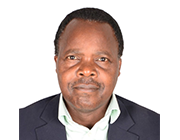|
Prof Diero is a holder of Master of Medicine in internal Medicine from the University of Nairobi and a fellowship in Medical informatics and health services research from Indiana University, USA. Additionally he received further training in tuberculosis and related lung diseases in Sondalo Training Institute in Italy, the University of Kwa Zulu Natal in South Africa and Brown University in the United States. He was elected to fellowship of the Royal College of Physicians of Edinburgh, Scotland in June 2019. This is a fellowship that is awarded to consultant physicians that recognizes clinical, Teaching and research achievements and confers international peer recognition. Prof Diero is the Technical Advisor for Tuberculosis and consultant in charge of clinical care at AMPATH. Additionally He chairs the adult medicine research working group with the responsibility of overseeing all research activities in adult medicine at AMPATH. Prof Diero has received several Research grants as the Principal Investigator including the current one called IeDEA project that is involved in creating a regional East African database with data collected in the process of routine care from HIV-infected patients enrolled in health centers in Tanzania, Kenya and Uganda.
|
Lameck O. Diero
Associate Professor of Medicine
School of Medicine
College of Health Sciences, Moi University

